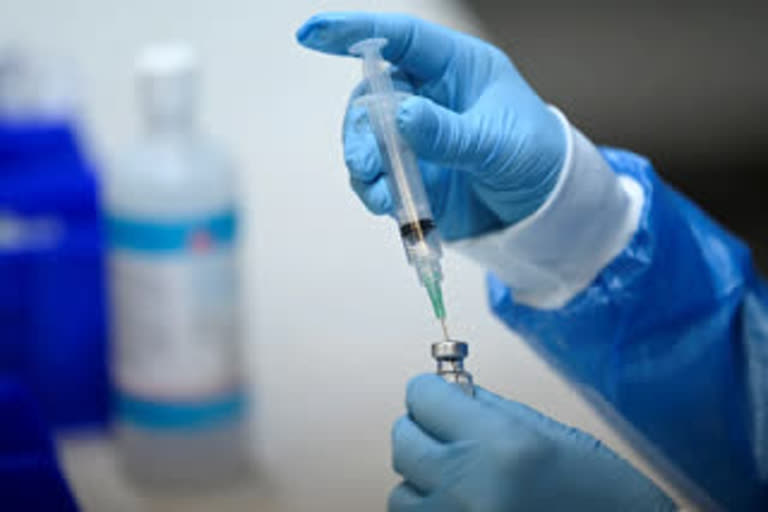New Delhi, Jun 8 (PTI) The government will spend up to Rs 1.45 lakh crore additional money to provide free vaccines and food grains to people devastated by the deadly second wave of COVID infections, sources said on Tuesday.
Prime Minister Narendra Modi's announcement of providing free inoculation to all adults will entail total spending of anywhere between Rs 45,000 crore and Rs 50,000 crore. This is higher than Rs 35,000 crore that the government had budgeted.
Extending 5 kg of wheat or rice and 1 kg of pulses every month to nearly 80 crore beneficiaries till November will cost between Rs 1.1 lakh crore to Rs 1.3 lakh crore.
Taken together, the additional spending could be up to Rs 1.45 lakh crore, the sources said.
Reversing a policy where states competed for vaccine supplies for certain age categories, Modi on Monday announced that the central government will procure vaccines for all adults. All above 18 years of age will get free vaccines from June 21.
Also, the free food grain scheme that was to end in June has been extended till November.
Read More: Only Rs. 4,744 Cr utilized from vaccine budget of Rs. 35,000 Cr
The sources indicated that the government may have got enough buffer from the larger-than-expected Rs 99,122 crore dividend from the Reserve Bank of India (RBI) and the windfall from record taxes on petrol and diesel.
The two together may just be enough to fund the free vaccines and the food grain cost.
The sources, however, did not say how and from where the vaccines will be procured.
India currently uses the AstraZeneca vaccine produced by the Serum Institute of India, and another developed at home by Bharat Biotech. Russia's Sputnik V will be commercially launched in the country by the middle of this month.
The government is also talking to other foreign vaccine makers to buy additional shots.
India has so far administered over 23 crore doses of vaccines in the world's biggest inoculation programme, which began on January 16.
Free food grains till Diwali
The Prime Minister announced that free food grain will be given to 80 crore vulnerable and poor people till Diwali to help them tide over the difficulties on account of the second wave of the pandemic.
The PM Garib Kalyan Anna Yojana (PMGKAY) was introduced last year during the first wave of the pandemic between April-November 2020. This will continue in the May to November 2021 period.
For the current fiscal, the food subsidy is estimated at over Rs 2.42 lakh crore.
The food subsidy rose sharply to over Rs 4.22 lakh crore in the RE (revised estimates) of 2020-21 from over Rs 1.15 lakh crore in the BE (budget estimates).
The government's decision to provide free ration to citizens during COVID-19-related lockdown and provisioning for the pre-payment of NSSF loans with FCI of about Rs 1.5 lakh crore were the major reason for the rise in food subsidy.
The Centre provided an additional quota of food grains free of cost during the April-November 2020 period of last fiscal to over 80 crore beneficiaries. Free rations were also given to migrant labourers.
Only Rs 10,000 crore more needed for vaccines: Report
The Centre’s move to freely supply Covid-19 vaccines to the states will result in an additional burden of Rs 10,000 crore on the government, Tanvee Gupta-Jain, the economist at UBS Securities India said in a note on Tuesday.
“Assuming an average price of Rs 150/dose, with a similar amount incurred on logistics and supply charges, we estimate the total fiscal cost to the Centre will be Rs 40,000-45,000 crore and of this Rs 35,000 crore have already been provided in the budget, which means that the Centre will have to allocate a maximum of Rs 10,000 crore for this,” she said in the note.
However, the vaccine distribution plan needs to made more transparent for effective and efficient allocation to the states and the key parameter remains the ability to ramp up vaccination supplies, she added.
The pace of vaccinations has slowed to 28 lakh doses per day to the week to June 6 from the peak of 36 lakh doses per day in the first week of April, largely on supply shortages.
“We still expect a meaningful ramp-up in daily vaccinations from 35 lakh doses in June to 60 lakh by November and around 42 per cent of the population or 60 per cent of the adults will be fully inoculated by December,” said the note.
(With PTI Inputs)



